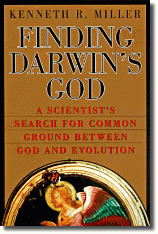Design on the Defensive
In his 1996 book, Darwin's Black Box, Michael Behe of Lehigh University began his case against evolution with these words:
" ... for the Darwinian theory of evolution to be true, it has to account for the molecular structure of life. It is the purpose of this book to show that it does not." [Darwin's Black Box, pp. 24-25]
Behe's work, which has become the scientific cornerstone of anti-evolutionists in the "Intelligent Design" movement, is really nothing new. What Behe did in his book was to take Rev. Paley's 200-year old "argument from design," dust it off, and wrap it in the shiny new cloth of biochemistry. Lest any one be tempted to point out that the argument from design has been answered repeatedly, Behe coined a phrase that led many to conclude there really might be something new to design at the biochemical level. That phrase was "irreducible complexity."
An irreducibly complex system, according to Behe, is one that requires several parts and which stops functioning if any one of those parts is removed. Because such systems have no function unless all of the parts are in place, evolution, which works step-by-step, could never have produced irreducibly complex systems. And, if evolution didn't produce them, they must have been designed. There you have it: proof of the intelligent design of the basic biochemical machinery of life.

There's just one problem with the Biochemical Argument from Design.
It's wrong.
I'm hardly the first person to point this out. Nature published a scathing review of Behe's book, and so did several other journals. There's even a web site called Behe's Empty Box that is packed with counter-examples to his arguments.
Nonetheless, when I wrote my 1999 book Finding Darwin's God, I thought it would be a good idea to point all of this out one more time. I devoted a full chapter to Behe's ideas, and presented a series of examples showing how Darwinian mechanisms could, and in some cases did, produce the "irreducibly complex" biochemical machines that Behe regards as proof of design.
It looks like my criticisms have hit home. In July, 2000 Behe placed a series of rebuttals to my criticisms on the web site of the Discovery Institute. It's an honor, of course, to learn that my writing has so disturbed the anti-evolution folks that they felt they had to respond. But the nature of these responses is particularly revealing. Not only do they fail to deflect the criticisms raised in my book, but they reveal the intellectual emptiness of a movement that once had pretentions to take the place of Darwin.
It's been a busy year for me, but as quickly as I can, I will analyze his rebuttals and post my analyses here. As the reader will see, each of his criticisms miss the mark:
|
Finding Darwin's God: A Scientist's Search for Common Ground Between God and Evolution. HarperCollins New York |